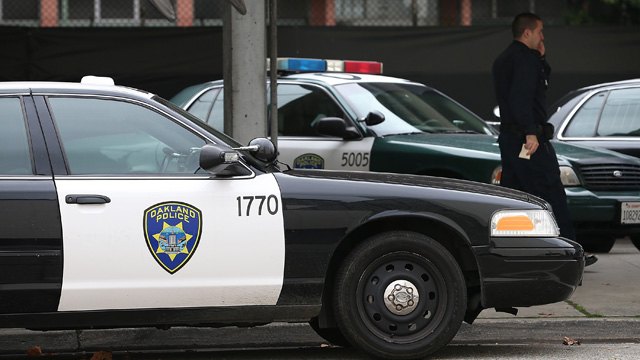Oakland PD Turns Over 4.6M License Plate Dataset Via Public Records Request
Via a public records request, the Oakland Police Department has turned over 4.6 million reads of 1.1 million unique plates recorded between 2010 and 2014.
Ars Technica made the request, resulting in the aforementioned license-plate reader dataset made between December 23, 2010 and May 31, 2014. The publication then hired a data visualization specialist to organize the dataset for its investigation into the practice.
With the permission of those contacted, the publication was able to track the movements of each individual based on their license plate, information that provides an insight into a given person’s life, according to University of California, Berkeley law professor Catherine Crump:
Where someone goes can reveal a great deal about how he chooses to live his life. Do they park regularly outside the Lighthouse Mosque during times of worship? They’re probably Muslim. Can a car be found outside Beer Revolution a great number of times? May be a craft beer enthusiast—although possibly with a drinking problem.
Crump adds that, as LPR technology comes down in price and becomes ubiquitous on the backs of police cars and in traffic lights, citizens should support restrictions on the data collected, from how long it’s stored and who can access it, to why it should be accessed in the first place.
Ars Technica also obtained data on OPD vehicles, discovering that a single unit — a 2007 Ford P71 — was scanned 879 times between January 15, 2012 and May 31, 2014 while it travelled through Downtown Oakland and North Oakland; nearly all of the 100 OPD in the dataset were also scanned several hundred times over.
As for how the publication was able to have this data in the first place, neither the OPD or the Oakland City Council has set a formal data retention limit; the police department deletes information as needed for new data, however. All OPD officers also have access to the LPR information at any time, and need not give a reason for accessing the data when searching for a given plate, though policy says such searches require “a legitimate law enforcement purpose, such as following up on a criminal investigation.”
Finally, OPD police captain Anthony Toribio explains that the data is publically available to anyone who asks, citing transparency as the reason:
I think it’s important for a law enforcement organization to be transparent, and it goes to being credible and establishing legitimacy in the community.
The OPD dataset is the second-largest LPR dataset to be released via request, the largest being one from a request by the American Civil Liberties Union to the Seattle Police Department in 2010. The request resulted in a dataset of over 7.3 million scans.
Seattle-based writer, blogger, and photographer for many a publication. Born in Louisville. Raised in Kansas. Where I lay my head is home.
More by Cameron Aubernon
Latest Car Reviews
Read moreLatest Product Reviews
Read moreRecent Comments
- FreedMike Miami is a trip - it's probably the closest thing we have to Dubai in this country. If you are into Lambos and the like, definitely go - you'll see a show every night. These condos fit right in with the luxury-brand culture - I'm surprised there isn't a Louis Vuitton or Gucci building. I was in Miami Beach in January with my fiancee, and we shared a lovely lunch that consisted of three street tacos each, chips and salsa, and two sodas. Tab: $70.00, with tip. Great town, assuming you can afford to live there.
- Kjhkjlhkjhkljh kljhjkhjklhkjh Pay money to be inundated in Adverts for a car that breaks when you sneeze? no
- Laflamcs My wife got a new 500 Turbo in 2015. Black exterior with an incredible red leather interior and a stick! The glass sunroof was epic and it was just about the whole roof that seemed to roll back. Anyway, that little bugger was an absolute blast to drive. Loved being run hard and shifted fast. Despite its small exterior dimensions, one could pile a lot into it. She remember stocking up at COSTCO one time when a passerby in the parking lot looked at her full cart and asked "Will it all fit?" It did. We had wonderful times with that car and many travels. It was reliable in the years we owned it and had TONS of character lacking in most "sporty" car. Loved the Italian handling, steering, and shift action. We had to trade it in after our daughter came along in 2018 (too small for 3 vacationers). She traded it in for a Jeep Renegade Latitude 6 speed, in which we can still feel a bit of that Italian heritage in the aforementioned driving qualities. IIRC, the engine in this Abarth is the same as in our Renegade. We still talk about that little 500..........
- Rochester If I could actually afford an Aston Martin, I would absolutely consider living in an Aston themed condo.
- Redapple2 I ve slept on it. I would take one on a 3 yr lease for $199/mo- ($1000 down total). Evil gm Vampire gave me this deal in 2012.


































Comments
Join the conversation
I'm more concerned that the data released is now "in the wild" where it could be misused by almost anyone. Yes, I agree that they proved how people's lifestyles can be determined; but is that really a bad thing when there is no concern? Such analysis when there IS a concern could far more readily help locate a criminal after a crime is committed or detect threats to individuals, groups or locations prior to an actual incident. Naturally such license plate tracking cannot be the sole basis for such concerns, but it can be used in conjunction with other detective work to prove their movements and even verify timing of events. More, it can help reduce individual crimes like stalking, kidnapping and rape by detecting patterns of presence in atypical areas, especially in the case where the victim has asked the police for protection. But as we all should know, any technology that can be used for good can also be used for ill. Imagine a scenario right here where someone suggested Ars Technica run this test just so they could access the data and stalk a target. Did Ars Technica really do good here, or did they enable a criminal through good intentions?
I saw this on Ars a couple days ago. Ars was trying to prove a point: that there's downsides to obtaining this data, and serious downsides to it's retention beyond a few hours/days. What Ars did, anyone could do. And frankly, anyone probably is doing this. One of the issues with big data isn't that it's collected, it's that, with storage and processing being so cheap, you can retain data for months/years and crunch it effortlessly. A few years back you'd have to be Google to do this; now you can just buy processor time on Azure/AWS/GCE and do it yourself. We can't really do squat about corporations hoarding data, but government, at least, is notionally accountable, and local governments are easiest to persuade. The problem is the whole "soft on crime/terror/drugs" mindset that makes it very hard to stop.